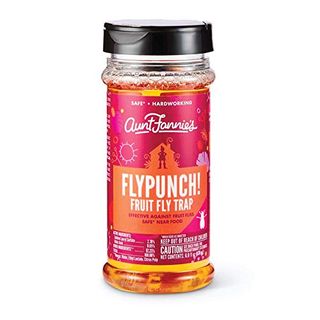It’s funny — well, not really — how something so tiny can become such a big annoyance. Gnats, flies, no-see-ums, whatever you call them, can easily take over your house, especially if you forget to wipe up a sugary spill, overwater your plants, or let your ripened bananas sit out for one day too many. While they’re unsightly and irritating, these pests actually won’t do any harm. “Their mouth parts aren’t designed to bite,” Orkin entomologist Chelle Hartzer explains. “There’s not any diseases that actually transmit.”
The problem: If you don’t tackle the problem head-on, gnats can quickly take over your home. Luckily, there are easy and effective ways to stop these winged creatures in their tracks — and prevent them from coming back time and time again. When you catch sight or sound of them, follow this simple guide on how to get rid of gnats.
Identify the pest.
Just because there are teeny-tiny bugs flying around doesn’t necessarily mean they’re gnats. Fruit flies, drain flies, and fungus gnats are three of the most common offenders, so you’ll need to get up close and personal to see what you’re dealing with.
Eliminate their food source.
Fruit flies won’t stick around if they don’t have anything to feast on. For the time being, stick produce in the fridge or inside bins as much as possible. You should also rinse fruits and veggies as soon as you get home from the store. “There may be some eggs or very, very tiny larvae,” Orkin entomologist Chelle Hartzer says. “By washing them and storing them sealed up, fruit flies can’t find that food source anymore.”
It’s not so simple for drain flies. Since they prefer bacteria, sewage, and gunk in your drain, garbage disposal, or seldom-used toilet, Hartzer advises using a drain cleaner like Drano Max Gel Clog Remover to flush out the pipes. If the problem persists, an ongoing infestation may indicate a leak, so call a plumber.
As for fungus gnats, exercise your green thumb. These pests love humidity and moisture, so ease up on the watering. Repotting houseplants in new soil also helps. “It’s great for the plant and it’s great to reduce gnats,” Hartzer explains.
Lay a trap.
While those preventative measures will stop gnats at the source, sometimes it’s best to take immediate action. Here are the most effective ways to get rid of gnats:
Make a trap with apple cider vinegar and plastic wrap.
DIY your own fruit fly trap by pouring a little apple cider vinegar into a glass, or just removing the cap from a bottle. Cover the opening in plastic wrap and secure with a rubber band. Then, poke a few small holes for the fruit flies to enter.
Trap flies with a paper cone, vinegar, and old fruit.
Place a little vinegar and a chunk of very ripe fruit in a jar. Then, roll printer paper into a cone and stick it into the jar, placing the narrow opening down. The smell of rotting produce will help entice the fruit flies into the mixture, but the paper cone will make it difficult for them to escape.
Drown flies by leaving out a bowl of vinegar and dish soap.
Add three drops of dish soap to a bowl of vinegar, and leave it uncovered. The soap cuts the surface tension of the vinegar, so the flies will sink and drown.
Put out an almost-empty bottle of old wine or beer.
Along with vinegar, fruit flies also like the smell of wine and beer. Leave out an open bottle with a little leftover liquid — the skinny neck will keep the flies trapped. The Old Farmer’s Almanac also recommends using stale beer to attract fruit flies.
Buy a fail-safe fly trap.
For an easy fix, buy Aunt Fannie’s FlyPunch! on Amazon. The mixture uses the active ingredients, including sodium lauryl sulfate (a surfactant used in soaps) and malic acid (found in fruit). Just open the top, set it on your counter, and “watch the cycle of life unfold.”
This content is created and maintained by a third party, and imported onto this page to help users provide their email addresses. You may be able to find more information about this and similar content at piano.io
Source: Home Ideas - goodhousekeeping.com





